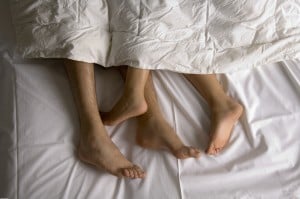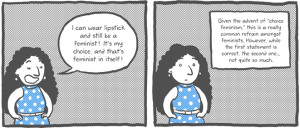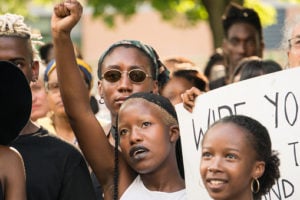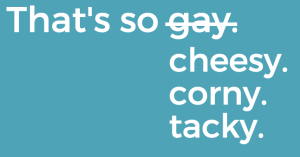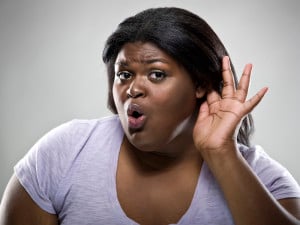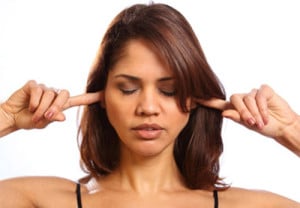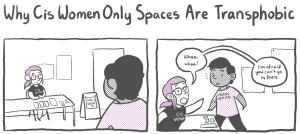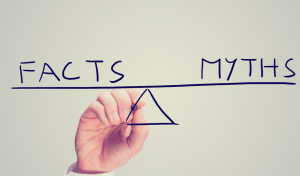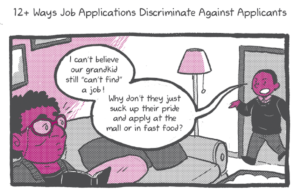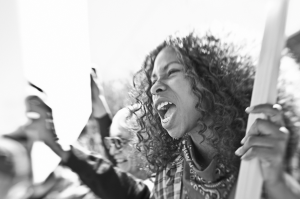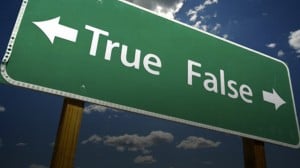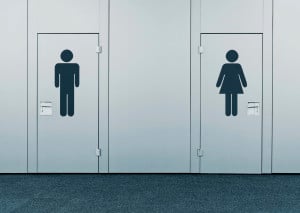
Source: Marie Claire
As I come to the end of my first Minnesota winter, I have never been more excited for spring.
Temperatures above 32 degrees! Sunshine on my skin! Long walks with my partner and the puppy! Even just writing this makes me freak out a little in anticipation.
Which is why I was really surprised to see a woman express on Facebook how much she was dreading Spring.
“If it weren’t for the incredible weather, Spring would be intolerable.”
Comments immediately exploded with, “WHAT!?” “Spring is the best time of year!!” “Seriously? Why would you ever say that!?”
She went on to explain, “Don’t get me wrong. I want to love Spring, but the moment I step out in anything less than a full-length down coat, the street harassment-o-meter goes wild! I can’t take it!”
I immediately felt incredible shame. After all, when I am completely honest with myself, I know that I contribute to the kind of masculinity that causes her to dread Spring.
It’s not that I overtly participate in street harassment. Quite the opposite, really. Usually I try pretty hard to follow the lead of these guys.
But when I am completely honest with myself, I recognize that far too often, when I meet a woman, my eyes go down.
Every single woman knows exactly what I am talking about, as they experience it on the daily from pretty much every straight man (and even some not-so-sraight men).
And just about every straight man knows exactly what I’m talking about — because we’ve done it.
More Than Just Attraction
When I try to talk to other men (and some women) about this, I often get, “What’s the problem? It’s completely natural to look at another person’s body with attraction.”
And they’re right. I don’t mean to communicate that we should experience shame for feeling lust or for checking someone out.
And I suppose if my eyes wandering down existed in isolation, one could argue that it is simply a natural part of attraction.
We want to appreciate beauty, and part of that is taking in the physical beauty of the people around us.
But our actions never exist in isolation.
My wandering eyes exist as part of a daily onslaught women face where their bodies are treated as public property – leered at, jeered at, and objectified in every major media outlet and in the eyes of most men.
Objectified. Though the word is used on the regular, it is powerful.
Quite simply, it means to degrade something to the status of mere object.
Every single time that I cannot hold a woman’s gaze and every single time that I choose to look at a woman’s ass as she walks by, I communicate one thing.
You are not a human being. You are a body. You are little more than an object for my pleasure.
So where’s the line between appreciating another’s beauty and turning them into an object?
To be honest, I don’t know.
But I have a few questions that help me to tease out the difference.
1. Do I Understand The Impact?
So much of working against oppression is understanding the impact of our actions.
If I understand that the impact of my using oppressive language is that I hurt other people while furthering a system of oppression, I can begin to change my actions.
Well, it’s much the same for me with objectifying women. It is important for me to check in with the impact any time that I have the inclination to catch that quick glance or to stare.
What impact is my action going to have on the person I am looking at, on the other women who might see me, and on the men who are taking cues from me?
The uncomfortable fact is that the combination of biological attraction and socialization is mighty powerful.
Just about everyone is inclined to check out someone they’re attracted to.
But in the case of straight men, we are taught to take it a bit further.
From the time that I was young, I was taught in subtle and not-so-subtle ways that everything belongs to me, in large part because I’m a man (though there’s definitely some racial and class socialization thrown the mix).
Thus, I have learned that my gaze is more than a simple look and appreciation.
It’s more of an ogle, and it communicates a multitude of messages.
It communicates that all bodies are available to me, that as a man, I control all space, and thus, any body that enters that space is mine to leer at and comment upon (verbally and non-verbally).
My gaze also communicates that I have the weight of capitalist patriarchy behind me.
Behind my stare exists an advertising industry that objectifies women’s bodies for incredible profit.
Behind my stare is a political system that seeks to regulate women’s bodies outside of their control.
Behind my stare is a pornography and media machine that communicates in nearly every single message that women are endlessly inadequate, weak objects and that men are dominant, in control, and powerful.
And this has real-world effects!
At age thirteen, 53% of American girls are “unhappy with their bodies.” This grows to 78% by the time girls reach seventeen.
Five to ten million adolescent girls and women struggle with eating disorders and borderline eating conditions, and 90 percent of those who have eating disorders are women between the ages of 12 and 25. (Source)
Now, am I causing the women around me to hate their bodies simply because I am looking? Absolutely not!
But when nearly every single man stares or hollers at a woman while she walks past ultra-thin models in billboards whose bodies are dissected and distorted to sell a product, it has a compounding effect.
But in talking about this, we should also recognize that this hurts men too.
Is it the same thing when men are objectified in a Calvin Klein ad or when a someone stares at my body at the pool?
No, simply because there is not the weight of an all-encompassing system of gender oppression behind that objectification.
But that doesn’t mean that it doesn’t hurt men to be objectified. More and more men are struggling with eating disorders and the use of steroids to achieve that “perfect body” is on the rise.
So then, if I know these realities, is that enough to find the balance between objectification and appreciation? Is that enough to transform my leers into respect?
2. Is There A Relationship?
Simply understanding the negative impacts of my behavior is clearly not enough to change my actions and their impact. If that were the case, I would have been able to give up soda long, long ago.
As I think about the ways that I objectify women with my gaze, I can’t help but think of the difference in how I look at the women with whom I have relationships as compared to a random woman on the street.
One of the many reasons that leering and catcalling is so hurtful and problematic is because it divorces a woman from her humanity.
It makes her an object of the male gaze and desire.
But it is indeed possible to appreciate the physical beauty of another person without turning them into an object.
But doing so often requires something more than a simple glance on the street.
It requires a relationship.
There are many women in my life who I recognize are beautiful. My best friends Sheila and Becca are both gorgeous women, and I can remind them of their beauty (inside and out) without it crossing the line into objectification simply because they understand our relationship.
They understand that I love and respect them for a myriad of reasons, and if I compliment them on their looks, there is a trust that they could tell me if that made them uncomfortable and there is a relationship to help them understand that it not simple objectification.
Similarly, if I tell my partner that I think she has an amazing ass (and boy, do I remind her often), that exists within the humanizing trust of a relationship.
She understands my meaning and intent, and if she doesn’t, she can call me on it or talk to me about it.
She could even ask me not to talk about her body in that way and trust that I would stop.
Now, a relationship is not at all a blanket permission to comment on someone’s body or to stare at them.
But relationships are a good place to start in drawing the line between objectification and appreciation of beauty.
3. Who’s In Control Of This Ship?
In the end, though, for me the line is drawn the moment that I decide that I am a human being, capable of free will and of controlling my thoughts and impulses, including my sexual ones.
In “Why Saying ‘Men are Slaves to Their Sex Drive’ is Insulting to Men,” I put it this way:
Whether you believe it’s divine endowment or an evolutionary outcome, pretty much every human being is capable of rational thought and will power.
This separates us from the “natural world” because, in essence, we have the ability to rationalize our way beyond simple biological urges and will ourselves to act differently.
In the end, it is a natural part of my attraction to other people to look at another person’s body.
But I am not a slave to that attraction.
I can choose to avert my eyes.
I can choose to briefly look and move on.
I can choose to show the woman the respect she deserves by holding her eye contact while we talk.
There are a lot of powerful subconscious forces, both biological and learned, that compel me to stare, to gawk, to catcall.
But what’s amazing about our brains is that the relationship of influence and control between our subconscious and conscious thought is reciprocal.
We are not slaves to the subconscious.
In the end, I have to ask myself, “Who is in control of this ship?”
Will I let my sexist, misogynistic socialization continue to hurt the women in my life with my subtle and not-so-subtle objectification?
Or will I choose to walk in the direction of being a male ally?
The choice is mine.
[do_widget id=”text-101″]
Jamie Utt is a Contributing Writer at Everyday Feminism. He is the Founder and Director of Education at CivilSchools, a comprehensive bullying prevention program, a diversity and inclusion consultant, and sexual violence prevention educator based in Minneapolis, MN. He lives with his loving partner and his funtastic dog. He blogs weekly at Change from Within. Learn more about his work at his website here and follow him on Twitter @utt_jamie. Read his articles here and book him for speaking engagements here.
Search our 3000+ articles!
Read our articles about:
Our online racial justice training
Used by hundreds of universities, non-profits, and businesses.
Click to learn more





